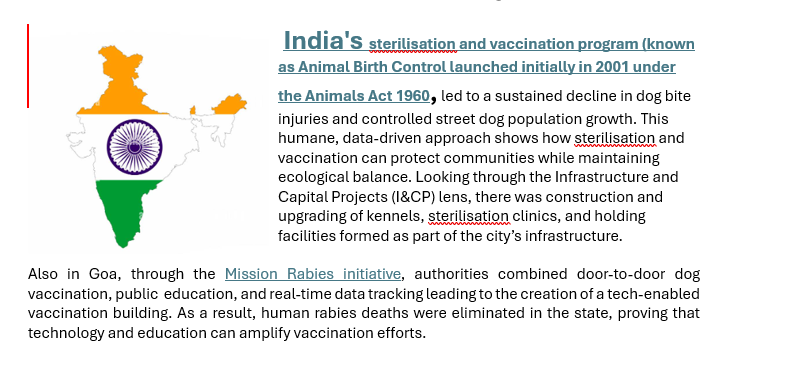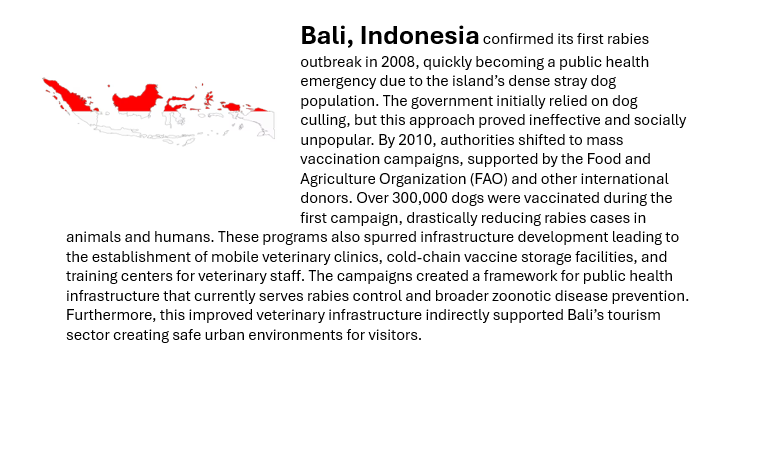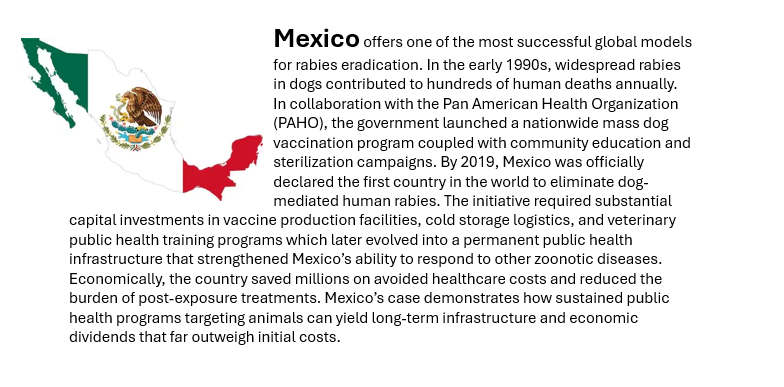
Introduction
In Ghana, the streets of Accra is home to many free-roaming animals; mainly dogs and cats. Many residents are familiar with the honorable mentions, such as the local mongrels or pariah dogs, African shorthair cats, farm animals, reptiles, and rodents. To many, this appears to be just animal-welfare concern, but the reality is broader. Stray animals intersect with public health, environmental management, urban safety, and governance(through the establishment of clear policies, enforcement mechanisms, and accountability frameworks that ensure sustainable urban management). posing economic and social costs when left unchecked.
Managed well, stray animals present an opportunity for humane animal care, sustainable development, job creation, and long-term economic growth. A humane, systematic program to remove, rehabilitate, and redistribute stray animals can deliver strong ESG (Environmental, Social, and Governance) outcomes while creating opportunities for capital projects that improve urban living and investment attractiveness.
Why This Matters
The challenge is not abstract. Effectively managing stray animal populations is important because it not only improves animal welfare but also enhances the quality of life. Key aspects include;
Environmental: Stray animals often scavenge in unmanaged waste systems, spreading litter and sometimes contaminating food and water sources. Roaming livestock such as goats, sheep and cattle are commonly seen scavenging in unmanaged waste streets.
Sustainable cities require controlled ecosystems where both human and animal life coexist safely. Establishing structured waste management systems, community-based feeding or shelter programs, and routine veterinary controls can prevent the environmental hazards caused by unmanaged stray populations. Moreover, aligning waste management policies with sanitation infrastructure may create cleaner and healthier public spaces, reducing the attraction of scavenging animals.
Social: Dog bites, rabies, and zoonotic diseases remain significant risks globally. In Ghana, the Ministry of Food and Agriculture has reported hundreds of rabies-related deaths in recent years, alongside high rates of dog-bite injuries from unvaccinated strays[1]. Beyond health, unmanaged stray populations may affect tourism, urban safety, and overall quality of life.
A sustainability lens emphasizes education and community responsibility of animals. Encouraging responsible pet ownership, spay-and-neuter programs, and public sensitization campaigns can reduce stray populations while promoting compassion and coexistence. Involving schools, local assemblies, and religious institutions in this behavioural change effort can transform the issue from a municipal burden into a shared societal responsibility.
Governance: Good governance plays a pivotal role in the sustainable removal of stray animals from urban streets because it ensures that every stage of management from capture and shelter to rehabilitation and adoption is transparent, accountable and aligned with broader public-policy goals. Moreover, integrating stray animal strategies into urban sustainability plans helps ensure that interventions are scalable, financially viable and aligned with environmental and social objectives
Economic: Creating public-private partnerships to establish animal shelters, veterinary clinics, or adoption programs can generate employment for youth and veterinarians. Additionally, Ghana could explore green value chains such as composting animal waste or producing biofertilizers that convert animal by-products into economic value. Properly structured systems like these could help local governments move from a cost-based animal control model to a circular, self-sustaining system.
Local NGOs such as SANCORE have shown that rescue, rehabilitation, and adoption is possible. However, without coordinated municipal investment and infrastructure, these efforts remain insignificant.
Global Case Studies
Ghana is not starting from scratch. Around the world, many nations have successfully tackled stray populations while creating long-term economic and social benefits.




Stray Animal Management as an Investment Opportunity
Urban animal management should not be seen as a cost burden. Properly framed, it is an opportunity that not only feeds into Ghana’s broader development agenda but also creates financial value for private investors through Private Sector Participation (PSP) or Public-Private Partnerships (PPP)
- Animal Shelters and Adoption Centers
Private investors can establish commercial or semi-commercial animal shelters and partner with local assemblies or NGOs to rehabilitate and rehome stray animals.
Revenue Streams:
- Adoption fees from individuals, schools, and security companies.
- Corporate sponsorships and Corporate Social Responsibility (CSR) partnerships with brands that want to align with humane and sustainability initiatives.
- Boarding services for pet owners, adding a steady revenue stream beyond strays.
- Retail of pet care essentials- food, grooming, and accessories etc.
Shelters could become self-sustaining enterprises when structured as social businesses, attracting impact investors and ESG-linked funding.
- Veterinary and Animal Health Services
Removing stray animals can potentially increase demand for vaccination, sterilization, and general veterinary services. Investors can partner with local governments to provide these services under Public-Private Partnership (PPP) models.
Revenue Streams:
- Government contracts for vaccination and sterilization programs.
- Sale of pet medications and preventive healthcare products.
- Subscription-based veterinary care for newly adopted animals.
The animal health sector in Ghana remains underdeveloped and untapped. Investors who venture into this sector early enough can establish regional market dominance and then scale into agribusiness or livestock care.
- Waste-to-Resource (Circular Economy) Ventures
Stray animal waste and carcass management can feed into bioenergy, composting, and fertilizer production value chains.
Revenue Streams:
- Production of biogas for sale to households and institutions.
- Organic fertilizers derived from processed animal waste for agricultural farming
- Animal by-products recycling, e.g. collagen and bone meal for pet food or agriculture.
- Technology and Data Services
Tech startups can develop digital animal identification, tracking, and reporting systems to support local assemblies in managing stray populations.
Revenue Streams:
- Subscription models for municipalities or NGOs.
- Licensing of animal registration databases.
- Partnerships with veterinary clinics for data-driven pet care solutions.
On the other hand, this presents an opportunity for government such as;
- Job Creation
Every clinic, shelter, and adoption center generates direct employment (vets, handlers, trainers, administrators) and indirect opportunities (construction workers, feed suppliers, IT providers), contributing to Ghana’s pressing need for youth employment.
- Driving Economic Development
- Urban Living Safety: Safer, cleaner streets enhance Accra’s image as a business hub and tourist destination.
- Public-Private Partnerships (PPPs): Shelters and clinics can be operated under PPP models, blending efficiency with municipal oversight.
- Financing Opportunities: With measurable ESG outcomes, such projects can attract concessional loans, impact investment, and CSR partnerships.
What Has Ghana Done in The Past?
Ghana has previously sought to solve the issue of stray animals in times past. Some of these include:
- National Rabies Control & Prevention Action Plan (2018-2030): Ghana has a formal action plan to eliminate dog-mediated human rabies by 2030. It provides a blueprint for interventions like vaccination, awareness raising, surveillance, and stakeholder coordination.
- National Rabies Prevention Campaign (2023, Accra): To reduce rabies infection incidences in Ghana, the Ministry of Food & Agriculture and the Ghana Health Service launched a campaign with its partners under the theme: “Prevent the Bite or Scratch! Vaccinate your Dog! Stop Rabies Now!”. Part of the campaign included raising awareness, urging dog vaccination, and enforcement via municipal byelaws e.g., impounding stray dogs and penalties for non-vaccinated pets.
Dog Bite & Rabies Case Monitoring: Between 2020 and 2023, Ghana recorded six hundred and fifteen (615) suspected human rabies cases, resulting in 72 deaths according to the Ghana News Agency. In the same period, thousands of dog bites incidents were recorded each year with over 15,000 cases reported in 2020 with increase in subsequent years.
In many cases, Ghana’s efforts have touched on infrastructure or capital project, though not fully scaled or institutionalized. Key examples include:
- Veterinary Laboratories and Diagnostic Capacity
The Veterinary Services Department operates labs for surveillance and diagnostics in major regions across Ghana (e.g., Accra, Takoradi, Ho), serving as key infrastructure for disease detection.
- Legislation & Regulatory Infrastructure
The legal framework of Ghana (Act 83) and proposed updates via the Animal Health Bill represent institutional infrastructure which define norms, penalties, health protocols which regulates animal movement in Ghana.
- Public Health / Veterinary Campaign Infrastructure
Mass vaccination awareness campaigns such as the canine census and other, outreach programs and community health engagement are part of Ghana infrastructural efforts towards stray population reduction. However, these light infrastructures and sensitisation efforts are lighter infrastructures, but they require planning, logistics, human resources, and funding. The canine census is also part of that planning infrastructure.
- Municipal regulatory enforcement
Assemblies have used byelaws, and organized task forces to confiscate stray animals and impound stray animals which have been major steps towards building operational infrastructure. Unfortunately, these shelters or long-term holding facilities are less clearly described in the current major actions, making it challenging to fully execute these regulations.
How Can Ghana Learn from Other Nations?
Indonesia’s pivot from ineffective culling to sustained mass vaccination programs could be a significant cue for Ghana. Indonesia’s campaigns required the creation of mobile veterinary units, cold-chain storage systems, and training programs for animal health workers. For Ghana, adopting a similar approach could catalyse investment into veterinary infrastructure, including modern shelters, diagnostic laboratories, and mobile vaccination centers across urban hubs like Accra, Kumasi, and Takoradi. These investments would reduce stray populations and rabies risks while strengthening Ghana’s broader public health infrastructure and providing resilience against zoonotic diseases such as anthrax or avian influenza. From a capital projects perspective, partnerships between government, international donors, and private investors could fund the construction of regional animal care facilities, create employment opportunities and stimulate our local economies.
Mexico’s success in eliminating dog-mediated human rabies demonstrates the long-term dividends of sustained public investment in animal health. Ghana can adopt Mexico’s model of combining vaccination with sterilization and community education while leveraging the capital project dimension. For example, the rollout of sterilization centers in major Ghanaian cities would require building new facilities, equipping them with surgical and diagnostic tools, and creating training pipelines for veterinary professionals. These projects would expand the country’s veterinary capacity and could be integrated into existing health infrastructure, making them cost-efficient. Mexico also showed that initial investments pay off by reducing healthcare costs and boosting economic productivity. Similarly, in Ghana, reducing the incidence of rabies and dog bites could free up significant public health expenditure for redirection of national resources into other preventive infrastructure that creates a more lasting economic impact.
Ghana can draw valuable lessons from Kenya’s experience with urban livestock management, particularly in Nairobi, where the coexistence of people and free-roaming animals has prompted reforms that balance livelihoods with public health and sustainability. Like Ghana’s cities, Nairobi faced challenges with livestock such as goats and cattle roaming in public spaces, contributing to waste buildup, traffic obstruction, and the spread of zoonotic diseases. Kenya’s response, integrating livestock management into urban planning, zoning certain areas for regulated animal keeping, and strengthening by-laws demonstrates how governance can align social and environmental goals. Ghana can adopt similar approaches by developing clear municipal frameworks that regulate ownership, grazing, and waste disposal, while supporting local farmers through designated livestock zones and extension services. This approach would reduce street congestion and health risks while preserving the economic value of small-scale livestock rearing. Additionally, Kenya’s focus on stakeholder collaboration involving city authorities, veterinary departments, and community groups offers Ghana a blueprint for sustainable animal governance that empowers local actors. By embedding animal control within broader urban sustainability and sanitation strategies, Ghana can move from reactive enforcement to a preventive, inclusive, and economically beneficial model of managing street animals
Developers can explore innovative construction technologies, materials, and building techniques to reduce construction costs and improve sustainability without compromising quality and safety standards. Also, Investors can consider investing in these eco-friendly infrastructure projects that align with social impact goals and contribute to sustainable development objectives. Lastly, Investors can diversify their portfolios to include a mix of different assets, including vaccination and sterilization centers, digital infrastructure systems (GIS mapping registries and surveillance databases), clinics, shelters, kennels, and labs.
Way Forward
Ghana has an opportunity to transform the challenge of stray animals into a platform for sustainable development. The first step is to develop a national stray animal management strategy directly linked to public health, infrastructure, and economic growth. Such a strategy should prioritize building modern animal shelters in Accra and other urban centers, equipped with veterinary facilities, sterilisation units, and rehabilitation spaces. These shelters will require initial capital investment in land acquisition, construction, equipment, and staff training, which may be costly but has the potential to generate new jobs and create demand across the construction, logistics, and pharmaceutical supply chains.
Beyond shelters, Ghana can invest in veterinary public health infrastructure. This includes laboratories for rabies and zoonotic disease testing, mobile veterinary units to serve peri-urban and rural communities, and a robust cold-chain system for storing and transporting vaccines. These facilities will strengthen Ghana’s broader animal health ecosystem; livestock farming and food security. By embedding animal health into national infrastructure planning, Ghana can build resilience against future public health threats while creating long-term capital assets.
On the sustainability front, removing stray animals from the streets supports environmental sustainability by reducing unregulated breeding and waste, while contributing to public safety. Socially, it reduces the burden of dog bites, rabies, and related healthcare costs, while ensuring safer communities for children, the aged and other vulnerable populations. Governance is enhanced when municipal authorities, private investors, and NGOs collaborate through transparent frameworks to manage shelters, run vaccination drives, and establish monitoring systems. ESG-aligned animal welfare programs can also attract international donor funding and impact investment, creating an additional financing stream for infrastructure projects.
Finally, Ghana can integrate technology and data systems into its approach. Building digital platforms for tracking vaccinations, shelter capacity, and adoption rates will modernise animal welfare management and strengthen accountability. These platforms could be incorporated into broader smart-city initiatives, reinforcing Ghana’s ambitions for sustainable urban development. In this way, efficiently managing stray populations can move beyond being recognized as a social service to becoming a strategic capital project with tangible economic, social, and environmental returns.
Glossary
PEP – Post-Exposure Prophylaxis
PSP – Private Sector Participation
PPP – Public Private Participation
I&CP – Infrastructure & Capital Projects
ESG – Environmental Social Governance
CSR – Corporate Social Responsibility
NGO – Non-Government Organization
FAO – Food and Agriculture Organization
PAHO – Pan American Health Organization
ILRI – International Livestock Research Institute


- President Commissions 36.5 Million Dollars Hospital In The Tain District
- You Will Not Go Free For Killing An Hard Working MP – Akufo-Addo To MP’s Killer
- I Will Lead You To Victory – Ato Forson Assures NDC Supporters
Visit Our Social Media for More




